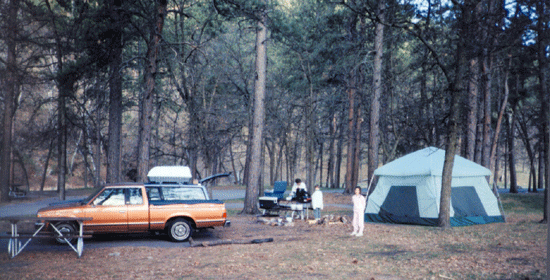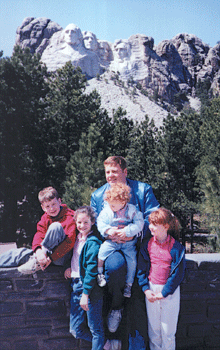Education as a Moving Experience
By Drue Porter
Printed in Practical Homeschooling #12, 1996.
 Drue Porter, our "Military Mom," shows how education can be a moving experience... or is it the other way around?
Drue Porter, our "Military Mom," shows how education can be a moving experience... or is it the other way around?

|
 |

 Would you like to teach your children fundamental life skills? How about doing a unit study with real-life application? Does the idea of winding up a history or science unit with a fabulous field trip appeal to you? Would you like to read good literature aloud with your children? Well, the opportunity to do these activities and more may be only as far away as your next PCS move. (PCS is military lingo for Permanent Change of Station).
Would you like to teach your children fundamental life skills? How about doing a unit study with real-life application? Does the idea of winding up a history or science unit with a fabulous field trip appeal to you? Would you like to read good literature aloud with your children? Well, the opportunity to do these activities and more may be only as far away as your next PCS move. (PCS is military lingo for Permanent Change of Station).
At first, preparing for and making a PCS move may seem to be a roadblock to your homeschool. True, the books may be put away for a while and you won't have reams of workbook pages to attest to your schooling efforts, but with a little planning and creative thinking your move could be one of the most valuable aspects of your children's education for the year.
Moving is an excellent time to teach your children important life skills, to have them apply many of the concepts they have learned in homeschool, and to reinforce book learning with real-life experiences. Of course, the plans you make and the activities you choose will depend on the amount of time you have to prepare and complete your move, the ages of your children, where you're moving to, and a host of other personal considerations. However, undertaking even one or two special activities can turn moving into a profitable educational experience.
Scheduling, organizing, and working as a team are some of the life skills that you can teach children in conjunction with a move. Since most military families transfer duty stations every two to three years, training your children in these areas will pay off each time you pack up and go. In addition, your children will continue to use these skills throughout their lives at home, in school, and in the work force.
Teaching Kids to Schedule
Scheduling is a skill you can begin teaching children as they approach junior-high age. Involve them in designing your pre-move plan as soon as you have received orders and have arranged your pack and move dates with the transportation office.
First, help your children make a list of what has to be done: clean out the basement and the attic, organize closets and drawers, fill out and send change of address cards, have a yard sale, and pack for the trip.
Then show them how to schedule tasks on the calendar in a logical and systematic order. Which jobs need to be done first? What can be done well in advance? Which tasks must wait for the last minute?
Next, guide them in assigning jobs. Who will clean out the attic? Who will help the younger children organize their toys and games? Who will sort through and straighten the kitchen drawers and cabinets?
Finally, have the kids actually carry out the tasks they have planned and scheduled.
Teaching Kids to Get Organized
Both older and younger children will learn many organizational skills as they help you prepare your household goods for the packers. They can be given the responsibility to sort through toys and games and decide which to keep and which to sell. Likewise, they can help separate clothes, books, and magazines into appropriate piles: one to keep, one to give away or sell, and one to throw out.
Younger children can work their boxed jigsaw puzzles (the 25-100 piece variety), making sure all the pieces are there and then securing the boxes with rubber bands, so pieces won't be lost when the puzzles are packed. They can do the same with board games and card games.
Your older children can help in the kitchen and other areas in the house. In addition, they can plan and run a yard sale, keeping a portion of the money earned to spend during the trip to your new home.
Teaching Teamwork
Teamwork is also an important skill for your children to learn. Working together as a team teaches children leadership and responsibility. They will gain confidence and develop a sense of accomplishment that can be drawn on in future endeavors.
We recently saw this principle at work in our own family. When we transferred from our last duty station, we were unable to hire a professional cleaning service to prepare our quarters for the final inspection. Armed with squeegees, scrubbers, and a bundle of other cleaning supplies we, as a family, embarked on one of the most grueling physical trials we have ever experienced. For three long days we all worked on that house. The light fixtures had to be taken down and washed, the walls had to be scrubbed, the bathrooms scoured. The kitchen appliances had to be dismantled and cleaned to like-new condition. The baseboards and windows had to be washed; the floors, swept and mopped. The basement had to be cleaned, and the trash cans scrubbed.
Our three older children helped us clean most of the house. They did spend some time with friends when we were tackling jobs well beyond their capability, but for the most part, they rotated between helping clean and watching the younger children.
In our normal routine, the older children help clean our home from top to bottom once a week, so they are well equipped as far as cleaning skills, but this was the first time they had to perform those skills under pressure and in a situation where their efforts would be critically evaluated by someone other than Mom and Dad.
On the morning of our final inspection, we waited anxiously for the housing inspector to arrive. Our older three took the younger children to the playground so we wouldn't have little feet tracking dirt in on our sparkling clean floors. The inspector arrived and walked from room to room, looking in closets and cabinets, scrutinizing the kitchen appliances, and examining the bathrooms. Would we pass or fail? How many things would we have to reclean? After looking the house over from top to bottom, she found two small discrepancies which we were able to correct with a quick wipe of the cleaning cloth.
When we told the children that we had passed the inspection you would have thought we had won the World Series from their shouts of joy and excitement! "We did it! We did it! We did it all by ourselves!"
Since then, there have been several occasions when we have been working on a "team" project that seemed too hard to complete. Reminding the kids of that success has encouraged them to persevere and succeed at those tasks.

|
|
The Porter family posing for a family photo in front of Mt. Rushmore.
|
Destination Inspiration
One of the best parts of being in the military is traveling and moving to new locations - actually seeing and experiencing places you've read about in books and studied about in school.
When you receive orders, the first priority is to decide where you are going to live (what kind of housing is available) and how are you going to get there (the most direct route). Once those decisions are made, however, your whole family will enjoy learning more about the region of the country where you will live and planning the trip to your new home.
If you have time, allow your older children to do a mini-unit study on the state to which you are moving. Have them research and find out about the characteristic geographical features, the climate, the main industries, and the natural resources. They can look up the state flag, seal, bird, flower, and tree and read about the state's history. They will discover many interesting facts.
As they gather data about your new home, they can update the rest of the family at the dinner table. This type of activity builds a positive attitude toward your new home even before you move.
Field Trips on the Way
Also include your children in planning the trip portion of your move. You can put their map-reading and math skills to work by having them help chart the route and figuring how far you must drive each day to get to your destination on time. They can calculate how much gas you will use and approximately how much will it cost. They can learn how camp or motel reservations are made and can figure out how much money your family will spend for meals while on the road. In addition to planning, your children can also keep records of actual expenditures during the trip.
Often, the most memorable parts of a journey to a new home are the field trips taken by your family en route. Coordinating these excursions with past or future topics of study makes them even more unforgettable. Using guides such as trip-planning computer software or travel books to determine what landmarks are on or near your route, you can plan an educational stop or two on the way to your new duty station. These "field trips" may be as simple as a picnic lunch at a battlefield or as adventurous as a camping trip in one of our country's beautiful national parks.
Before our last move across the country, we had studied frontiersmen and westward expansion. In keeping with our frontiersmen theme, we planned several adventures along the way, including camping in Yellowstone Park, an area explored by one of our favorite frontiersmen, John Colter.
Since we were there "off-season," in late April, we had no problem getting a campsite - the trouble was finding one without snow! That sleepless night, which I spent intermittently listening to a coyote howl and hiking to the bathroom to defrost my fingers under the hand dryer, cured me forever of romanticizing that era of American history. My children, however, will never forget waking up to the smell of bacon on the camp stove, walking out of our tent and being greeted by buffalo and mountain goats, and seeing the geysers that John Colter discovered.
Of course, these ventures don't have to be limited to a history theme. You can also take a science field trip along the way. Fossil beds or salmon and trout hatcheries make interesting stops. Many large cities have science centers and aquariums, such as the Pacific Science Center in Seattle, and the Monterey Bay Aquarium, in Monterey, California. One of the best stops we ever made was at the visitors' center of a nuclear power plant where we learned how a reactor works and all about producing energy.
Listen and Learn
These family adventures will definitely be the highlight of your journey, but portions of your trip will still be downright boring. Your children may have to sit through endless fields of corn in the Midwest or miles of vining kudzu in the South. You will have to listen to that age-old question, "Are we there yet?" at least a hundred times. But it's possible to make even this part of your move interesting and educational.
No doubt you will have the usual fare of paper, colored pencils, and travel games on hand. But instead of merely keeping the kids' hands busy, minds occupied, and mouths quiet, why not choose activities that complement and enhance what you have studied or are going to study in your homeschool?
You can use these monotonous portions of your trip to "read" a book together as a family by listening to a book-on-tape.
Renting books-on-tape is easy and convenient. Rental companies publish catalogs that describe the books and list the rental fees and loan periods. The books are sent with a stamped return mailer so when you are finished listening you simply seal the books in the return containers and drop them into any US mailbox.
"Reading" audio books is a great way to reinforce a unit study you've just completed or to build interest in a subject you will soon begin. It's also a good way to provide continuity in your homeschool during the interruption caused by the move.
For example, if you've recently done a science unit on insects, Freckles and A Girl of the Limberlost by Gene Stratton Porter are perfect choices. E.B. White's Charlotte's Web is fun if you've been to a county fair, or his Trumpet of the Swan is excellent if you're traveling through Montana or Boston or have studied birds. You could read Johnny Tremain if you're studying the American Revolution and planning to visit historical battle sites during your trip. Or if you're learning about Ancient Greece, listen to the Tangelwood Tales by Nathaniel Hawthorne or Aesop's Fables.
Even if you don't coordinate audio book selections directly with school themes, your family will enjoy listening to a variety of good books while traveling. Our family recommends listening to unabridged books. We have found light, humorous stories and those with a fairly simple-to-follow plot to be the favorites on trips. Some of the books we have enjoyed listening to are The Wind and the Willows by Kenneth Grahame, Little Lord Fauntelroy by Frances Hodgson Burnett, Heidi by Johanna Spyri, The Princess and the Goblin and The Princess and Curdie by George MacDonald, The Prince and the Pauper by Mark Twain, and Around the World in Eighty Days by Jules Verne.
Don't Overdo It!
In conclusion, let me urge you not to try all of these suggestions during any one move. While training your children in life skills will pay off in a savings of time in the future, it takes a large investment of time up front. Since time is limited when you are moving, you may only be able to teach a few new skills to your children, but those skills will be valuable additions to their education and growth.
On the other hand, don't limit yourself to only these ideas. Depending on your particular circumstance, you can incorporate almost any subject into your move - history, literature, writing, drawing, photography. Be creative and keep in mind that moving, which at first appears to be a hindrance to your homeschool, may actually be your best educational asset.